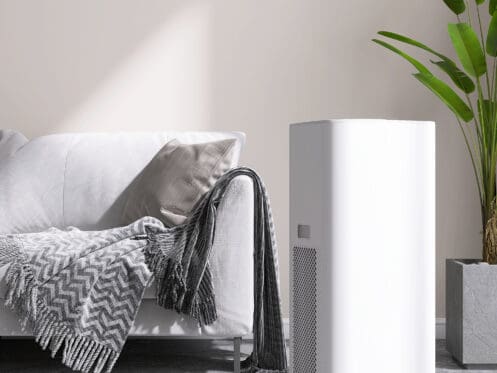Most people acknowledge how much heating and cooling affect indoor comfort levels, but humidity is equally important to consider. Humidity is the level of moisture in the air within a specific environment. The humidity levels in your Metuchen, NJ, home are drastically affected by the weather. You may not always notice changes in humidity, but there are many ways both high and low humidity levels affect indoor comfort.
The Effects of High Humidity
During late spring and summer, many households experience problems with high humidity. The hot air of summer has the capacity to carry much more water vapor than cold air, making humid days more common. Additionally, the summer heat evaporates water on the ground more quickly, which makes the air even more humid. The moisture in the air outside enters your house, increases the humidity levels, and makes you and your family uncomfortable in several ways.
Mold
Mold thrives in any place with food, warmth, and moisture. High levels of humidity make many homes a suitable place for a variety of mold spores to grow.
Mold exposure may cause numerous negative health effects, such as coughing, itchy or watery eyes, rashes, and headaches. People with respiratory illnesses also experience an increased severity of symptoms when living in a house with a mold issue.
Odors
It’s very difficult to relax or focus in a home that has odor problems. The mold and mildew that grow as a result of high humidity levels create musty smells that are difficult to eliminate.
Sleeping Issues
Insomnia is a common issue for people who live in homes with high humidity. Even without mold growth, high humidity can cause health issues, such as respiratory infections and bronchitis. It also worsens conditions like asthma and COPD. These irritating symptoms make it difficult to become comfortable enough to sleep.
Additionally, your body needs to be able to lower its temperature to comfortably sleep. Sweating is the main method your body uses to cool itself. The heat from your muscles is transferred to beads of sweat on your body through your skin. The heat is then carried away from your skin when the sweat evaporates, allowing your body to cool.
High levels of humidity prevent your sweat from evaporating. If the sweat can’t evaporate at a reasonable pace, the hot sweat just sits on your skin and makes you feel even hotter. Trying to sleep when you’re overheated and lying in a pool of sweat is a frustrating experience that no one should suffer through.
The Effects of Low Humidity
In late autumn and throughout winter, humidity levels are typically very low due to the freezing temperatures. Cold air is unable to hold nearly as much moisture as warm air. The lack of water vapor in the air outside affects your indoor humidity, even if the temperature in your home is much higher than it is outside. There are many ways in which low humidity makes you uncomfortable in your home.
Dry Skin
Healthy skin is springy and soft. Without moisture, your skin dries up, cracks, flakes, and becomes itchy. Dry skin not only causes discomfort and pain but also poses a risk to your health. Your skin is one of the best forms of defense your body has against germs. Having numerous tiny cracks all over your skin makes you more susceptible to infections.
Dry Eyes
Your natural tears dry faster when you’re in environments with low humidity, leading to dry eyes. When your eyes are dry, it can quickly cause itchiness, redness, blurred vision, and light sensitivity. People who use contacts may experience additional discomfort due to dry eyes.
Increased Severity of Respiratory Symptoms
Living in a home with dry air is a miserable experience for people with respiratory illnesses such as asthma, bronchitis, and COPD. The respiratory system is protected by a layer of fluid that keeps your airways healthy. When exposed to dry air, this fluid evaporates. The airways then become irritated and swollen, making it harder to breathe normally.
Dry air also increases mucus production. Mucus is necessary for removing pathogens, allergens, and other debris from your nasal passages. In addition, mucus also helps further lubricate your airways.
However, increased mucus buildup is problematic for people with respiratory illnesses. A high level of mucus in the body leads to difficulty breathing, intense coughing fits, and a higher risk of illness. In addition, low humidity dries out the mucus, making it thick, sticky, and much harder to remove from your airways.
Sore Throats
Dealing with a sore throat is always uncomfortable. You’re in constant pain, and it’s difficult to swallow or talk. Even if you don’t have respiratory illnesses, your throat still needs moisture to stay in a healthy and pain-free state. When humidity levels are low in your home, it can make your throat feel dry, scratchy, and irritated.
Nosebleeds
Nosebleeds are uncomfortable, frustrating, and messy. There are many causes of nosebleeds, but one of the most common culprits is dry air. The membranes in your nose are incredibly thin and delicate. Like the rest of your respiratory system, these membranes need protective fluid to stay healthy. When they dry out due to the low humidity levels in your home, they crack and bleed.
Increased Risk of Illness
There’s a reason why late autumn and winter are known as the cold and flu seasons. Viruses tend to be active much longer in dry air than in humid air. Less moisture in the air causes water droplets to turn into an aerosol. Viruses within these tiny droplets stay floating in the air for much longer periods of time, increasing their opportunity for transmission.
Additionally, dry air has a detrimental effect on your immune system. The cilia in your body are partially responsible for removing viruses, germs, and other particulates from your system. When the cilia dry out, they become damaged and are unable to remove viruses and germs from your body nearly as effectively.
Maintaining Healthy Humidity Levels in Your Home
The ideal humidity range for the average home at any time of year is around 40% to 60%. The best way to ensure that the air in your home stays within a healthy humidity range is by having a humidifier and a dehumidifier installed in your HVAC system.
Humidifiers add moisture to the air that flows through your heating system in the winter. Alternatively, dehumidifiers draw moisture from the air through your air conditioner during the summer. Using humidity sensors, the system will ensure that the humidity levels in your home stay at your desired level.
If you’re interested in regulating the humidity levels in your home to make it more comfortable, you can count on our skilled technicians at First Choice Plumbing, Heating & Air Conditioning. We can provide you with timely, skilled, and professional service. In addition to dehumidifier and humidifier installation, we also provide installation and repair services for air conditioners, heaters, air purification systems, water heaters, sump pumps, and much more. For additional information on any of the services we provide to the areas in and around Metuchen, contact us at First Choice Plumbing, Heating & Air Conditioning today.




